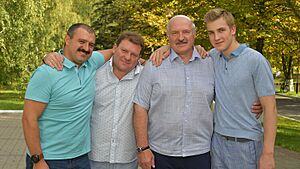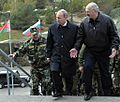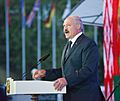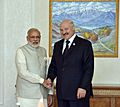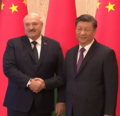Alexander Lukashenko facts for kids
Quick facts for kids
Alexander Lukashenko
|
|
|---|---|
| Александр Лукашенко Аляксандр Лукашэнка |
|

Lukashenko in 2024
|
|
| 1st President of Belarus | |
| Assumed office 20 July 1994 |
|
| Prime Minister |
|
| Preceded by | Myechyslaw Hryb (as Chairman of the Supreme Council) |
| 1st Chairman of the All-Belarusian People's Assembly | |
| Assumed office 24 April 2024 |
|
| Deputy | Aleksandr Kosinets |
| Preceded by | Office established |
| Chairman of the Supreme State Council of the Union State |
|
| Assumed office 26 January 2000 |
|
| Chairman of the Council of Ministers | |
| General Secretary |
|
| Preceded by | Office established |
| Member of the Supreme Council of Belarus | |
| In office 25 August 1991 – 20 July 1994 |
|
| Preceded by | Office established |
| Succeeded by | Office abolished |
| Personal details | |
| Born |
Alexander Grigoryevich Lukashenko
30 August 1954 Kopys, Byelorussian SSR, Soviet Union (now Belarus) |
| Political party | Independent (1992–present) |
| Other political affiliations |
|
| Spouse |
Galina Zhelnerovich
(m. 1975) |
| Children |
|
| Occupation | Politician |
| Profession | Economist and collective farmer |
| Signature | |
| Military service | |
| Allegiance | |
| Branch/service |
|
| Years of service |
|
| Rank | Lieutenant colonel |
Alexander Grigoryevich Lukashenko (born 30 August 1954) is a Belarusian politician. He has been the President of Belarus since 20 July 1994. This makes him the longest-serving European president.
Contents
Early Life and Education
Alexander Lukashenko was born on 30 August 1954. His birthplace was Kopys in the Vitebsk Region of what was then the Byelorussian Soviet Socialist Republic. He has sometimes said his birthday is 31 August, the same as his son Nikolai's. This is because his mother went to the hospital on August 30 but gave birth after midnight.
Lukashenko grew up without his father. His mother, Ekaterina Trofimovna Lukashenko, worked many jobs. She worked on a railway, at a construction site, and in a flax factory. Later, she was a milkmaid in Alexandria, a small village in eastern Belarus.
He went to Alexandria secondary school. He studied at the Mogilev State A. Kuleshov University and graduated in 1975. He also studied at the Belarusian Agricultural Academy, graduating in 1985.
Military and Early Politics
In 1979, Lukashenko joined the Communist Party of the Soviet Union. After serving in the military, he worked on farms. In 1982, he became the deputy chairman of a collective farm, called a kolkhoz. By 1985, he was the director of a state farm, known as a sovkhoz.
In 1990, Lukashenko was elected as a Deputy to the Supreme Soviet of the Byelorussian Soviet Socialist Republic. This was like being a member of parliament. He became known for speaking out against corruption. In 1993, he was chosen to lead the anti-corruption committee of the Belarusian parliament. He accused some high-ranking government officials of corruption. These accusations led to the resignation of the Supreme Soviet chairman.
Presidency of Belarus
How Belarus is Governed
The way Lukashenko governs Belarus is sometimes called "Lukashism." He presents himself as a "man of the people." When he became president in 1994, Belarus's economy was struggling. He decided to keep many industries under government control. He wanted to make Belarus "powerful and prosperous."
Since a public vote in 1996, Lukashenko has held most of the power in Belarus. His decisions and orders are very important. He also has a lot of control over how the government spends money. Most members of the parliament support him. He also chooses many judges.
Belarus's Economy
Lukashenko's early economic plans aimed to avoid problems seen in other former Soviet countries. He wanted to prevent huge companies from being owned by a few rich people, called oligarchs. He also wanted to avoid widespread unemployment. By 2011, the unemployment rate was very low, at 0.6%. The average income per person also increased.
One challenge for Lukashenko has been the value of the Belarusian currency, the ruble. It has sometimes lost value. In 2011, there was a big drop in its value. Belarus has also received loans from other countries, like China, to help its economy.
Some people who disagree with Lukashenko use the term "Lukashism" to describe his political and economic system. They say it's an authoritarian system. This means the government has a lot of control. It is also linked to a "cult of personality," where people are encouraged to admire him greatly. The US Congress passed a law in 2004 to support groups in Belarus who oppose Lukashenko's government.
Lukashenko's supporters say his leadership helped Belarus avoid problems that other former Soviet countries faced. Lukashenko has said that elections in Belarus are for the Belarusian people. He believes they are the ones who control their country.
COVID-19 Pandemic Response
During the COVID-19 pandemic, Lukashenko stated that he was against making vaccination required. He said that vaccination would remain a choice for people in Belarus.
Personal Life
Family and Children
Alexander Lukashenko married Galina Zhelnerovich in 1975. They had two sons, Viktor (born 1975) and Dmitry (born 1980). Galina lives separately from him in a village. They are still legally married, but they have not lived together for many years. Lukashenko has said he did not want to divorce because of his adult sons.
Lukashenko also has a younger son, Nikolai, born in 2004. The identity of Nikolai's mother has not been publicly shared. Nikolai was raised by his father. Lukashenko has a pet dog, a spitz named Umka.
Sports and Hobbies
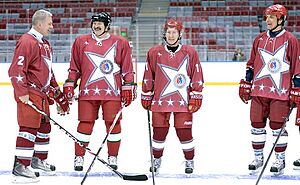
Lukashenko used to play football. He is also a big fan of ice hockey and plays it often. He has even started his own amateur team called the Belarus President's team. Many ice rinks have been built across Belarus because of his interest in hockey. Belarus hosted the 2014 IIHF World Championship in ice hockey. They were also supposed to host the 2021 championship, but this was canceled.
As a child, he trained in cross-country running. He still competes at a national level in the 2000s. He also enjoys skiing.
Beliefs
Lukashenko describes himself as an "Orthodox atheist." This means he follows Orthodox traditions but does not believe in God. He believes a president should be a traditional person. He also prefers not to use modern electronic devices like tablets or smartphones. He used to play the bayan, which is a musical instrument similar to an accordion.
Awards and Honors
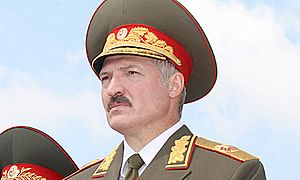
Lukashenko has received many awards and honors from different countries and organizations. Some of these include:
- Medal "In memory of the 850th anniversary of Moscow" (1997)
- Winner of the international premium of Andrey Pervozvanny "For Faith and Loyalty" (1995)
- Medal "Bethlehem-2000" (Palestinian National Authority, 2000)
- The Order of José Martí (Cuba, 2000)
- Order of the Revolution (Libya, 2000)
- Special prize of the International Olympic Committee "Gates of Olympus" (2000)
- Order "For Merit to the Fatherland", 2nd Class (Russia, 2001)
- Honorary citizen of Yerevan, Armenia (2001)
- Order of St. Dmitry Donskoy, First Degree (by the Russian Orthodox Church) (2005)
- Medal of the International Federation of Festival Organizations "For development of the world festival movement" (2005)
- Order of St. Cyril (by the Belarusian Orthodox Church) (2006)
- Honorary Diploma of the Eurasian Economic Community (2006)
- Order of the Holy Equal-to-the-Apostles Grand Duke Vladimir, 1st Degree (2007)
- Grand Chain of the Order of the Liberator(Venezuela, 2007)
- Order of St. Vladimir, First Degree (by the Russian Orthodox Church) (2007)
- Keys to the City of Caracas, Venezuela (2010)
- Order of Distinguished Citizen (Caracas, Venezuela, 2010)
- Order of Francisco Miranda, First Class (Venezuela, 2010)
- Order of the Republic of Serbia (2013)
- Presidential Order of Excellence (Georgia, 2013)
- Order of St. Sava, 1st Degree (2014)
- Order of Alexander Nevsky (Russia, August 30 2014)
- Order of St. Seraphim of Sarov, 1st Degree (2015) – for protecting the spiritual values of the Belarusian people and helping peace between different faiths.
- Badge of the Investigative Committee of the Republic of Belarus "For Merit" (Investigative Committee of the Republic of Belarus, February 11, 2016)
- Order of the Republic (Moldova, October 4, 2016) – for helping friendship and cooperation between Belarus and Moldova.
- Order of Heydar Aliyev (Azerbaijan, November 28, 2016) – for helping friendly relations and cooperation between Belarus and Azerbaijan.
- Order of Nazarbayev (Kazakhstan, 2019)
- Ig Nobel Prize (Peace in 2013, Medical Education in 2020)
- Honorary Doctor of Science, Taras Shevchenko National University of Kyiv. He lost this title on June 7, 2021. This happened because of an event where a plane was forced to land in Belarus. He was the first person in the university's history to lose this title.
Images for kids
-
Official ceremony of signing Treaty on Establishing Russian-Belarusian Union at the Kremlin Palace, between the Russian President Boris Yeltsin and Belarusian President Lukashenko, 1997
-
Alexander Lukashenko standing with Vladimir Putin and Leonid Kuchma at the Slavic Bazaar in Vitebsk in 2001
-
Alexander Lukashenko alongside Syrian President Bashar al-Assad during a state-visit to Syria in December 2003
-
Meeting of Alexander Lukashenko with Iranian supreme leader Ali Khamenei and president Mahmoud Ahmadinejad in 2006
-
Lukashenko with Dmitry Medvedev in the Kremlin, December 2008
-
Lukashenko and Putin at the Russian-Belarusian military exercises in 2013
-
Lukashenko during a meeting with Indian prime minister Narendra Modi in 2016
-
Lukashenko during a meeting with Azerbaijani president Ilham Aliyev in Baku, Azerbaijan, April 2021
-
Lukashenko, Putin, Erdoğan, Xi Jinping, Modi and other leaders at the Shanghai Cooperation Organisation summit in Samarkand, September 2022
-
A demonstration in Warsaw in 2004, raising awareness about the disappearances of opposition activists in Belarus
-
With Russian president Vladimir Putin during a news conference in 2002
-
Lukashenko with Russian prime minister Mikhail Mishustin in 2020
-
Meeting of the Russian-led military alliance, Collective Security Treaty Organization (CSTO), in Moscow on 16 May 2022
-
With U.S. secretary of state Mike Pompeo in 2020
-
With Chinese leader Xi Jinping in 2023
See also
 In Spanish: Aleksandr Lukashenko para niños
In Spanish: Aleksandr Lukashenko para niños
 | Valerie Thomas |
 | Frederick McKinley Jones |
 | George Edward Alcorn Jr. |
 | Thomas Mensah |


